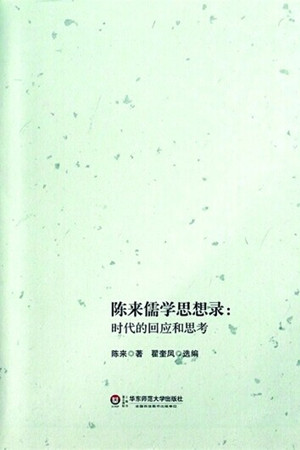Chen Lai’s Thoughts on Confucianism
Author : Source : Chinese Social Sciences Today 2014-08-15

Chen Lai’s Thoughts on Confucianism
Author: Chen Lai,
(edited by Zhai Kuifeng)
Publisher: East China Normal University Press, February 2014
Rebuilding traditional values with reason
By He Jun
The publication of Chen Lai’s Thoughts on Confucianism comes at the right time as researchers bring into focus the status of traditional Chinese culture in the contemporary era and ponder its future development. As Chen Lai pointed out, the prerequisite for the renaissance of Confucianism is the advancement of modernization in China. Now that we are 30 years into the process of reform and opening up, we are closer than ever before to the goal of a great rejuvenation of the Chinese nation. At this crucial moment, it becomes urgent to answer questions regarding what Chinese culture should be like and how traditional culture should be viewed.
Chen’s work gives us the confidence to elucidate and disseminate the excellent traditional culture of China. Chinese government calls for promoting core socialist values must be done on the foundation of outstanding traditional culture. But, what culture can be deemed “outstanding,” and who is entitled to make decision? Chen Lai’s elite academic research — the interpretation of Confucianism in particular — provides a valuable reference.
However, it is doubtful whether a consensus can be made among the academic community on the interpretation of Confucianism. Take values for instance. Many pay attention to citizens, society and the nation, but as far as I’m concerned, the family is of special importance to the Chinese people.
In the West, the church functions as a bridge between the family and society and plays a significant role in one’s socialization. By contrast, in China, it is the family that plays the vital role, serving as both the starting and finishing point for everyone. In fact, the destruction of traditions in modern times has all started with the family. Currently, it is worth considering if we need to rethink the meaning of the family and reconstruct morality starting with the family.
Chen maintains that the renaissance of Confucianism should focus on the practice of social life, and on this point I totally agree. Take patriotism for example. Zhang Taiyan argued in a lecture in the 1930s that to love one’s country means to love its people, to which end one should have filial piety and shoulder fraternal duty. It will be unlikely that a person can love others if one does not love one’s parents and siblings.
Zhang’s view is a typical embodiment of Confucianism. Moreover, according to Zhu Xi’s interpretation on the related quotation in the Analects of Confucius, filial piety and fraternal duty are not equal to benevolence but are rather the foundations for benevolence.
In addition, Chen revealed three approaches to neo-Confucianism: academic, cultural and civil. The academic approach emphasizes academic research. The cultural approach tries to articulate the meaning of Confucianism for modern China from the perspective of Confucian culture, while the civil approach focuses on practice. In traditional China, however, Confucianism covers all aspects of life and the world. For instance, the Classic of History can be regarded as ancient politics, and gezhi is equal to today’s natural science.
To conclude, the concerns of Confucianism involve the entire academic world, which now lacks what Zhu Xi once called reason. The three approaches advocated by Chen Lai narrowed the scope of concerns of Confucianism. In fact, Confucianism serves as a reference not just for philosophy but all disciplines.
Chen Lai, a renowned philosopher in China, is the dean of the Academy of Chinese Learning and professor of the Philosophy Department at Tsinghua University. He is also the first director of the Academic Committee at the Mencius Research Institute.
He Jun is professor, vice president of Hangzhou Normal University
Translated by Ren Jingyun
Ye Shengtao made Chinese fairy tales from a wilderness
Ye Shengtao (1894–1988) created the first collection of fairy tales in the history of Chinese children’s literature...
-
How northern ethnicities integrated into Chinese nation
2023-09-18
-
Mogao caves
2023-09-12
-
Mogao Grottoes as ‘a place of pilgrimage’
2023-09-12
-
Time-honored architectural traditions in China
2023-08-29
-
Disentangling the civilizational evolution of China
2023-08-28
-
AI ethics in science fiction
2023-08-23














 2011-2013 by www.cssn.cn. All Rights Reserved
2011-2013 by www.cssn.cn. All Rights Reserved